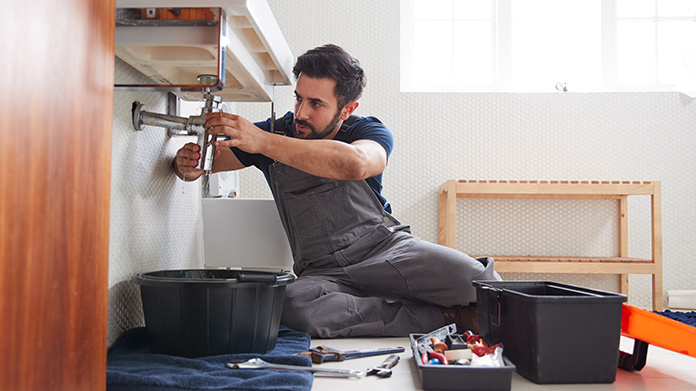Should I Start an LLC for My Plumbing Business?
Starting a limited liability company (LLC) for your plumbing business can provide several benefits.
Most importantly, an LLC structure offers limited liability to its owners, which can protect their personal assets from lawsuits and creditors.
For a plumbing business, lawsuits can arise from things like an employee damaging a neighboring house while repairing a customer’s plumbing, and a customer injuring themselves when an employee leaves tools in a walkway.
LLCs are also affordable, highly flexible (from a tax point-of-view), and can make your plumbing business seem more credible.

Interested in getting started? More than 84% of our readers form their LLC through a specialized LLC formation service in order to save time and avoid potential penalties.

Do I Need an LLC for a Plumbing Business?
LLCs are a simple and inexpensive way to protect your personal assets and save money on taxes.
You should start an LLC when there’s any risk involved in your business and/or when your business could benefit from tax options and increased credibility.
LLC Benefits for a Plumbing Business
By starting an LLC for your plumbing business, you can:
- Protect your savings, car, and house with limited liability protection
- Have more tax benefits and options
- Increase your business’s credibility
Limited Liability Protection
LLCs provide limited liability protection. This means your personal assets (e.g., car, house, bank account) are protected in the event your business is sued or if it defaults on a debt.
Plumbing businesses will benefit from liability protection because of the relatively high risk involved with repairing and installing water pipes on a residential and commercial basis.
Example 1: While moving equipment from your service truck to a construction site, the rear end of your pipes hits a neighbor’s window, and the glass shatters. The house owner is unhappy and decides to sue for compensation. Your LLC status will protect your personal assets from liability and limit the lawsuit to your business assets only.
Example 2: A client hires you to fix a fault, but you mistakenly damage a sewer pipe while working. Contents from the pipe drain into some items they preserved at the backhouse and caused them to rot. If the client decides to sue for their pipe and damaged goods, your business may be held responsible, but you will personally be safe.
Example 3: A new factory gives you an enormous plumbing contract. A few months later, the work becomes faulty. The factory owner alleges that your employees either used inferior materials or did a substandard job. They threaten to take legal action for the inconvenience caused. If they sue, your business may pay compensation while your personal assets will remain safe.
An LLC will also protect your personal assets in the event of commercial bankruptcy or loan default.
To maintain your LLC’s limited liability protection, you must maintain your LLC’s corporate veil.
LLC Tax Benefits and Options for a Plumbing Business
LLCs, by default, are taxed as a pass-through entity, just like a sole proprietorship or partnership. This means that the business’s net income passes through to the owner’s individual tax return.
The business’s net income is then subject to income taxes (based on the owner’s tax bracket) and self-employment taxes.
Sole proprietorships and partnerships are taxed in a similar way to LLCs, but they do not offer limited liability protection or other tax options.
S Corp Option for LLCs
An S corporation (S corp) is an IRS tax status that an LLC can elect. S corp status allows business owners to be treated as employees of the business (for tax purposes).
S corp tax status can reduce self-employment taxes and will allow business owners to contribute pre-tax dollars to 401k or health insurance premiums.
The S corp status requires that the business pay the employee-owner(s) a reasonable salary for the work they perform.
In addition, the business might need to spend more on accounting, bookkeeping, and payroll services. To offset these costs, you’d need to be saving about $2,000 a year on taxes.
We estimate that if a plumbing business owner can pay themselves a reasonable salary and at least $10,000 in distributions each year, they could benefit from S corp status.
You can start an S corp when you form your LLC. Our How to Start an S Corp guide will lead you through the process.
For questions about tax solutions for your plumbing business, we recommend scheduling a free tax consultation.
Credibility and Consumer Trust
Plumbing businesses rely on consumer trust. Credibility plays a key role in creating and maintaining any business.
Businesses gain consumer trust simply by forming an LLC.
A growing business can also benefit from the credibility of an LLC when applying for small business loans, grants, and credit.
Launch Your LLC With Tailor Brands
More than 84% of our readers form their LLC through a specialized LLC formation service like Tailor Brands in order to save time and avoid potential penalties.
How to Form an LLC
Forming an LLC is easy. There are two options for forming your LLC:
- You can hire a professional LLC formation service to set up your LLC for a small fee
- Or, you can choose your state from the list below to start an LLC yourself
Select Your State
- Alabama LLC
- Alaska LLC
- Arizona LLC
- Arkansas LLC
- California LLC
- Colorado LLC
- Connecticut LLC
- Delaware LLC
- Florida LLC
- Georgia LLC
- Hawaii LLC
- Idaho LLC
- Illinois LLC
- Indiana LLC
- Iowa LLC
- Kansas LLC
- Kentucky LLC
- Louisiana LLC
- Maine LLC
- Maryland LLC
- Massachusetts LLC
- Michigan LLC
- Minnesota LLC
- Mississippi LLC
- Missouri LLC
- Montana LLC
- Nebraska LLC
- Nevada LLC
- New Hampshire LLC
- New Jersey LLC
- New Mexico LLC
- New York LLC
- North Carolina LLC
- North Dakota LLC
- Ohio LLC
- Oklahoma LLC
- Oregon LLC
- Pennsylvania LLC
- Rhode Island LLC
- South Carolina LLC
- South Dakota LLC
- Tennessee LLC
- Texas LLC
- Utah LLC
- Vermont LLC
- Virginia LLC
- Washington LLC
- Washington D.C. LLC
- West Virginia LLC
- Wisconsin LLC
- Wyoming LLC
For most new business owners, the best state to form an LLC in is the state where you live and where you plan to conduct your business.
Do LLCs Need Insurance?
All businesses need insurance to protect their business assets — even LLCs. This is because the limited liability protection from an LLC protects your personal assets, not your business assets.
Plumbing businesses need insurance to cover risks such as damage to service trucks, loss of work equipment, and clients’ and employees’ lawsuits clients.
Common Situations Business Insurance May Cover for a Plumbing Business
Example 1: One of your plumbers is working in a customer’s home. He accidentally causes a pipe to leak onto a staircase. To fix it, he heads outside to his vehicle to retrieve a specific type of wrench. The customer walks down the steps while the pipe continues leaking and slips on the staircase, sustaining a broken ankle and a concussion on the way down to the bottom. If your company is found liable, general liability insurance could probably cover some of the damages as ordered by the court or agreed upon in a settlement.
Example 2: While working beneath a sink, one of your plumbers ends up damaging the food disposal unit. After the plumber leaves, the homeowner loses their wedding ring in the drain. As they reach in, the broken disposal triggers and badly damages the homeowner’s hand. General liability insurance would probably help to cover court-ordered payments or any settlement reached in the event your business is found liable.
Example 3: A plumber fails to correctly repair a leaky pipe, fixing the problem for only a day. The leak resumes worse than before, dripping steadily for many hours onto a hardwood floor. The flooring is badly damaged by the excess water and requires a complete replacement. General liability insurance would probably serve to cover some of the cost if found liable in court or if a settlement were reached.
Other Types of Coverage Plumbing Businesses Need
While general liability is the most important type of insurance to have, there are several other forms of coverage you should be aware of. Below are some other types of insurance all plumbing businesses should obtain:
Commercial Property Insurance
Plumbing companies need plenty of equipment as well as somewhere to store it. If these assets are damaged, it can be disastrous for your business. A wise business owner will acquire a good commercial property policy to protect his or her valuable tools, vehicles, machinery, storage facilities, and other physical items. Commercial property insurance covers damages to owned real estate and company equipment due to disasters like fire and extreme weather.
Commercial Auto Insurance
Reliable trucks or vans can be incredibly beneficial for a plumbing company to own. Hauling lots of heavy tools and equipment to customers’ homes is a normal part of the plumbing business, meaning that if you invest in a commercial vehicle for you or your employees, you may need this policy. Commercial auto insurance covers vehicular damages to your company vehicles, whether they are driven by you personally or by your workers.
Workers’ Compensation Insurance
Most plumbing companies hire a number of plumbers in order to meet the daily demands of local houses and their water systems. Plumbers hired full-time or part-time by your company will need to be covered by a workers’ compensation policy. This insurance keeps them covered in the event of on-site accidents and provides various benefits that result from damages suffered by your workers while on the job.
Should I Start an LLC FAQ
Choosing the right business structure depends on your business’s unique circumstances and needs. However, unless your business is very low risk (like a hobby), an LLC is likely the better option.
Visit our LLC vs. Sole Proprietorship guide to learn more.
At a minimum, you’ll need general liability insurance.
Read our Plumbing Business Insurance article for more info.
To start, you will need equipment such as assorted pipes, fittings, saws, cordless screw guns, propane torches, cast iron pipe cutters, etc. Purchasing all this equipment can cost $5,000 or more. Additionally, you will need to acquire a service truck and a certificate.
Visit our How to Start a Plumbing Business guide to learn more about the costs of starting and maintaining this business.
Ongoing expenses include maintenance on vehicles, maintenance/replacement of materials/tools, insurance, and office expenses (e.g., rent, utilities, etc).
Learn more about running a plumbing business.
Plumbing companies charge a flat rate (sometimes plus materials) for jobs. However, they may also charge per hour or premium surcharges for emergency, rush, or off-hours service.
Learn more about starting a plumbing business.
There is always a need for water and sewer pipe repair and service. This means a consistent demand for plumbers. One advantage of starting a plumbing business is that you can start small, working alone and keeping costs down, and then scale up by hiring more plumbers when you’re ready. Eventually, this can turn into a very profitable business.
Learn more about starting a plumbing business.


